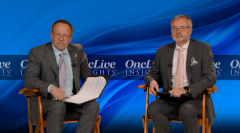
Future Outlook for Endometrial Cancer Treatment
Experts discuss the possibility to avoid use of chemotherapy by using immunotherapy.
Episodes in this series

Transcript:
Bradley J. Monk, MD, FACS, FACOG: I’m really excited to get dMMR [deficient mismatch repair] approved probably in the US earlier. That’s generally what happens. I have no idea. But perhaps even maybe over the summer of 2023 it might get approved, so we’ll have to see. Do you think there will be differences in the countries for reimbursement for RUBY [NCT03981796] and dMMR dostarlimab [Jemperli]?
Christian Marth, MD, PhD: I don’t think that there will be a difference in the reimbursement in Europe.
Bradley J. Monk, MD, FACS, FACOG: Approval is what I really mean.
Christian Marth, MD, PhD: Yes. Approval will be fast for both agents. The question is what drug we will use. We will, for sure be urged by our money giver to use the cheaper one.
Bradley J. Monk, MD, FACS, FACOG: Yes. That’s interesting. In the US, GARNET [NCT02715284] was a phase 2 trial in the second line in the MSI [microsatellite instability]-high/dMMR that led to approval in both Europe and the US. But we had more familiarity with pembrolizumab [Keytruda]. But dostarlimab is a very important medication. I don’t know if you knew this, but dostarlimab has been compared to pembrolizumab with chemotherapy in non-small cell lung cancer in a small phase 2 trial. The overall response rate in this PERLA trial [NCT04581824] reported at a meeting in December of 2023 by Solange Peters [MD, PhD, University Hospital of Lausanne, Switzerland] numerically favored dostarlimab. It wasn’t so numerically different in the small phase 2. The PFS [progression-free survival] also suggested that dostarlimab was superior. I think dostarlimab is here to stay. You also remember last year at ASCO [the American Society of Clinical Oncology annual meeting] they had those rectal cancers that were dMMR.
Christian Marth, MD, PhD: Only 100%.
Bradley J. Monk, MD, FACS, FACOG: Only 100% complete response rate and none of these individuals needed surgery for colostomy.
Christian Marth, MD, PhD: Yes. Amazing.
Bradley J. Monk, MD, FACS, FACOG: So this is a legitimate medication and it’s very interesting.
Christian Marth, MD, PhD: Yes, for sure. Both will stay. They have excellent results. I think this will also lead us to the future. Why do we really need chemotherapy for those patients? Can we think about avoiding the chemo [chemotherapy] and giving only checkpoint inhibitor therapy? There are 2 trials ongoing. The DOMENICA trial [NCT05201547] with dostarlimab and the GOG-3064 trials [NCT05173987] with pembrolizumab, randomizing patients with mismatch repair deficiency in chemo [chemotherapy] versus IO [immuno-oncology]. The problem may be that the control arm is not the best control arm you might use anymore.
Bradley J. Monk, MD, FACS, FACOG: I hear you.
Christian Marth, MD, PhD: But nevertheless…
Bradley J. Monk, MD, FACS, FACOG: You mean chemo [chemotherapy]/checkpoint rather than chemo [chemotherapy] alone?
Christian Marth, MD, PhD: [Yes,] rather than chemo [chemotherapy] alone. But these trials could give us insight. How should we proceed? Can we avoid chemotherapy in the future? There is also another trial, the ENGOT-en9/LEAP-001 trial [NCT03884101], which has concluded enrollment, and are waiting for the results. In this trial, mismatch repair proficient patients predominantly have been randomized to standard chemotherapy versus pembrolizumab plus lenvatinib [Lenvima].
Bradley J. Monk, MD, FACS, FACOG: Chemo [chemotherapy]-free, both of those ideas?
Christian Marth, MD, PhD: Yes. This trial might also answer whether we can avoid chemo [chemotherapy], chemo [chemotherapy]-free in mismatch repair proficient. I think that is really a bright future for endometrial cancer patients and how we can go further. Again, as I said before, we need more information. Which patients really benefit the most? We know that also, for example, mismatch repair deficient patients are not completely homogeneous. [Some] 75% have methylation of the promoter of MLH1 [MutL homolog 1] protein and the other under 25% has a mutation. And those with this mutation might have more mutations and therefore might be better candidates for new therapy. There are some trials, small trials, that suggest that indeed the response rate in these mutated patients is better than in the other one. I think we have to collect data to better understand and characterize those patients.
Transcript edited for clarity.






































